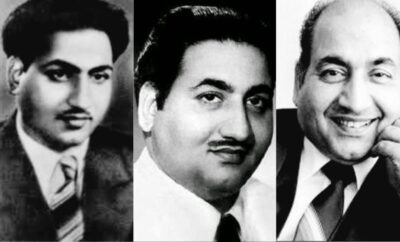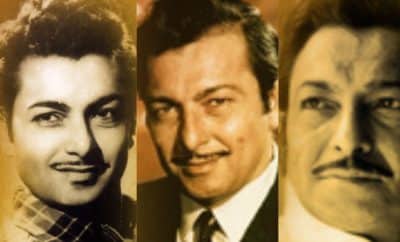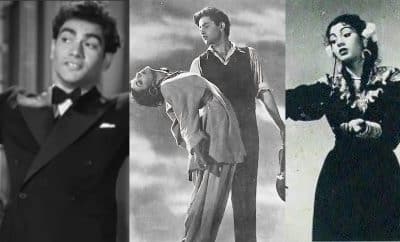Song Sketch
Not A Commodity For Sale – Hum Hain Mata-E-Koocha – Dastak
Hum hain mata-e-koocha-o-bazar ki tarah
Uthti hai har nigah kharidaar ki tarah
Iss Ku-e-tishnagi mein bahot hai ki ek jaam
Haath aa gaya hai daulat bedaar ki tarah
Wo toh kahin hai aur magar dil ke aas paas
Phirti hai koi shai nigah-e-yaar ki tarah
Sidhi hai raah-e-shauq pe yuhin kahin kahin
Kham ho gayi hai gesu-e-dildar ki tarah
Be-tesha-e-nazar na chalo raah-e-raftagan
Har naqsh-e-pa buland hai deewar ki tarah
Ab ja ke kuch khula hunar-e-nakhun-e-junoon
Zakhm-e-jigar hue lab-o-rukhsar ki tarah
Majrooh likh rahein hain ahl-e-wafa ka naam
Hum bhi khade hue hain gunehgaar ki tarah
This happens to be the complete original ghazal written by Majrooh Sultanpuri. The ghazal initially was a non-film ghazal. But it is said that the ghazal was included in the film at the behest of Madan Mohan who had heard Majrooh recite it and had loved the feel of the ghazal.
Sharing an audio clip of this song rendered in Madan Mohan’s voice (courtesy – Madan Mohan’s official site – madanmohan.in)
From the original ghazal of 7 stanzas, only 1,3 and 7 are included in the film version.
Dastak (1970), the directorial debut of writer Rajinder Singh Bedi. Salma (Rehana Sultan) and Hamid Ahmed (Sanjeev Kumar) are a young couple in search of a house. They are looking forward to fulfill their dreams together. The film is a sort of human fable, of plans, hopes and candyfloss romantic dreams. But fulfilling dreams wasn’t possible without a house to live in. They are misled by Akhtar Maratiwale (Anwar Hussain) into renting a small apartment in the midst of a red light area. The earlier occupant of that apartment is the infamous singer Shamshad. Due to this the couple is frequently disturbed by her old customers. The knocks on the door increase day by day horrifying the present occupants. Salma is a trained classical singer and loves singing, also practises it. This adds to their agony as people mistake her as the replacement for Shamshad.
Financial circumstances force Salma to pick up the tanpura and sing for an old, rich client of Shamshad, Seth Brij Mohan. She sings out her agony and the feel of her tortured state.
Beginning with a tranquilising tanpura and an equally sedative sitar strums, Lata Mangeshkar begins with a grave voice.
Hum hain mata-e-koocha-o-bazar ki tarah
Uthti hai har nigah kharidaar ki tarah
With every person eyeing me as a buyer would see a market (bazar) item, I feel like I’m a commodity sold in the market.
How easily people tag a woman with several names. Her mere presence in the market (society) is taken for granted, making her an item up for sale without her consent.
The interlude has beautiful sitar pieces nudging your heart, very Madan Mohan style and some subdued tabla beats that keep the rhythm of the ghazal alive.
Wo toh kahin hai aur magar dil ke aas paas
Phirti hai koi shai nigah-e-yaar ki tarah
Though my beloved is not here, his love always surrounds my heart. The objects around the place remind me of his presence.
Trying to say that she is not for sale, she is not a commodity. She is in love with her husband and her music. And she yearns only for his look, his eyes.
Interlude sitar pieces again bring out the agony, the helplessness, the frustration and the sdaness of the situation.
Majrooh likh rahein hain ahl-e-wafa ka naam
Hum bhi khade hue hain gunehgaar ki tarah
Majrooh Sultanpuri signs off with his name in the last couplet. This ghazal happens to be one of the 2 songs in HFM where he has done so. It says Majrooh writes this ghazal for the lovers, for the people in love. He feels guilty that such a situation should arise in the society. Every person who is a mere onlooker of such a situation is also as guilty as the culprit.
Based on Raag Bhairavi, which is a morning Raag, it enhances the poignancy of the song. Bhairavi is called the queen of melody. It creates an atmosphere full of love and piety (an irony to choose this song in this situation). The soft rendering and melody mesmerise the listeners even in this sombre situation!!




VIKAS LAKKAD
March 23, 2018 at 7:31 pm
Excellent translation provided … thanks , I will regularly visit SongPedia …..??
Deepa
March 23, 2018 at 9:56 pm
Thank you for the appreciation 🙂 hope you find the songs of your choice here!!
VIKAS LAKKAD.
March 28, 2018 at 6:14 pm
I read somewhere ( source I forgot ) that this ghazal was published in a book by Majrooh Sahab …I want to know the title, year of publication , and publisher ..if it is known…Thanks…
Kamal
March 14, 2019 at 8:43 am
I love the song . Everyone is marvellous who contributed in this doing be it’s singer lyricist n or music composer. Amazing song.
Jayesh buch
October 5, 2019 at 1:00 am
Excellent work of compiling, translating and providing Madan Mohan and Lata versions. If you could translate the entire gazal, it would make it even more interesting
Thanks for the great work
Deepa
October 13, 2019 at 10:38 am
Thanks a lot ?
Jagdip Dave
October 17, 2019 at 9:21 am
Madanmohan.in has treasure. Sitar in his songs was played by Rais Khan. There are nice rehearsal pieces.. Madanmohanji going in minute details.
A Trivia… Original version of Kadar Jane Na ho Kadar Jane Na.. was Darad Jane Na.
pradeep
December 30, 2022 at 11:12 am
thank u for urdu tohindi translation .hapefuly aabhar.